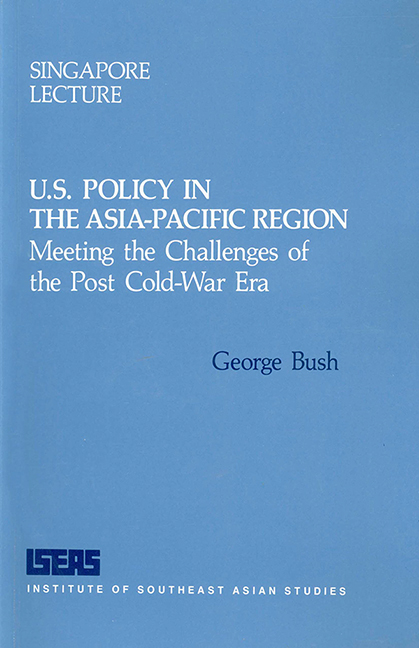III - Discussion
Published online by Cambridge University Press: 09 November 2017
Summary
Chairman:
Ladies and Gentlemen, the ever tighter schedule threatened to squeeze out the question and answer session. We have a few questions which the President has offered to meet. So, can I ask questioners to be brief, state your name, and get to the point quickly, please.
Question
Mr President, the trend towards closer economic interaction within regions — with Europe forging a single market and the United States, Canada and Mexico moving towards a North American Free Trade Area — will grow in momentum in the 1990s. How in your opinion can we ensure that these trends do not result in inward-looking economic blocs? How can APEC as a body promote greater economic openness and counter these inward-looking trends?
Bush:
First, help us reach a successful conclusion to the GATT round. Therein lies the most important single step that can guarantee against trading blocs. Second, accept my word that nothing in the North American Free Trade Agreement wants to contribute to dividing the world into trading blocs that shut out other people's goods. That is not what it is about. If we are successful in NAFTA, that will increase markets for Asian goods in South America, which has been an area that needs economic help. So, the first answer is help with GATT, successful conclusion of the Uruguay Round. And the second answer is, please understand that NAFTA — I can only speak for American participation therein, but I am sure it is also true of President Salinas of Mexico and Brian Mulroney of Canada — has no intention of having that free trade between ourselves be a bloc to ASEAN goods. Stop worrying about that! That isn't going to happen.
Question:
Mr President, I believe that most countries in the Asia-Pacific region want to see the United States continue to play a major economic and security role in the Western Pacific. But many are worried that Japan may become the leader in the economic competition, especially in trade and investments in the Asia-Pacific region. Will the United States respond to this Japanese economic challenge and stay in the competition? If Japan does eventually become the pre-eminent investor and trader in the region, will the United States be engaged in the economies and the security of the region?
- Type
- Chapter
- Information
- U.S. Policy in the Asia-Pacific RegionMeeting the Challenges of Post Cold-War Era, pp. 13 - 16Publisher: ISEAS–Yusof Ishak InstitutePrint publication year: 1992

